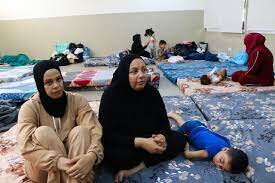Displaced people in Lebanon face deliberate governments negligence
Displaced people in Lebanon face deliberate government’s negligence
BNEIRUT- The Israeli aggression on Lebanon has caused about 21% of the displaced to seek refuge in 1,016 shelters set by the Lebanese government. However, most of these educational buildings are unfit for habitation. 90% of these centers have reached their maximum capacity and this poses serious health risks that are difficult to control if the government’s deliberate negligence persists.

So far, the Lebanese government has not published any data on the health conditions of those in the shelters. Though it was expected that 1.5 million citizens would be displaced, the government has failed to provide enough shelters and equip them with basic services, knowing that a small percentage of the displaced have not sought refuge in those places in fear of health problems and other resulting problems.
Indeed, the Israeli aggression on Lebanon has completely changed the face of the capital Beirut, especially its commercial center, as thousands of displaced people have headed there. For example, in the Azarieh center in Beirut Governorate, the number of displaced people is estimated at 3,000.
Overcrowding in Beirut is due to the multiple waves of displacement the Lebanese have faced since October 2023.
Regardless of the size of the room and the number of family members (which range from 4 to 15), each displaced family has been given one room, which poses health risks, as overcrowding – especially during autumn – encourages a widespread outbreak of bacterial respiratory diseases, especially among children.
The government had enough time to remedy the situation for the displaced, but it was negligent. These shelters lack sufficient toilets and hot water supplies specified by international relief organizations. This has led to the spread of scabies and lice among the displaced.
While the government is still discussing the establishment of kitchens to meet the food needs of the displaced, 90% of them receive only one meal per day provided by NGOs and individual initiatives, despite the availability of financial resources and international aid arriving via Beirut airport.
The needs of special groups such as the elderly and people with special needs are not met, which is a catastrophic reality that Lebanon has suffered from even before the war.
Besides, the displaced are highly threatened by psychological illnesses resulting from trauma and the martyrdom of relatives; stress disorders, depression, and widespread involuntary urination.
Lebanon’s Ministry of Health has taken coordination measures between displacement centers and primary care clinics that provide most of the basic medicines and vaccines for children. However, this is not enough because the care centers are far away and the availability of health services and medicines varies between them. The displaced do not receive emergency care, especially in private hospitals, which provided 85% of treatment services before the war.
Amid talk of an imminent ceasefire, serious concerns are emerging about the government’s handling of the post-war situation, which will have difficult humanitarian and psychological implications, noting that the deliberate neglect may be aimed at breaking the will of the resistance community and weakening it.
source: tehrantimes.com